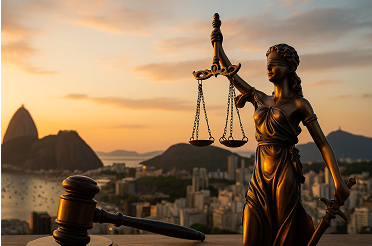Rio de Janeiro
Av. Presidente Wilson, 231 / Salão 902 Parte - Centro
CEP 20030-021 - Rio de Janeiro - RJ
+55 21 3942-1026

Facing criminal charges in Brazil is a life‑altering event. From the moment police launch an inquiry, every statement, document, and tactical decision influences the final verdict. A Brazilian criminal defense attorney is the guardian of constitutional rights, examining evidence, disputing unlawful searches, and negotiating strategic agreements with prosecutors. This guide delivers an end‑to‑end overview of Brazilian criminal procedure, empowering readers to act confidently and clearly in a high‑stakes environment.
Police inquiries begin with a boletim de ocorrência or a prosecutor's directive. Investigators collect witness testimony, forensic reports, bank statements, and digital footprints. Defense counsel may petition for additional evidence, question witnesses, and monitor the chain of custody. Early Intervention often reveals exculpatory proof that shapes charging decisions.
When the Ministerio Publico feels evidence suffices, it files a denuncia detailing facts, legal classification, and witness lists. The judge reviews admissibility and can dismiss weak cases. Defense attorneys file preliminary motions to exclude illegal evidence, raise statute‑of‑limitation bars, or claim improper venue.
Discovery involves reviewing police files, ordering independent expert opinions, and prepping witness examinations. Strategic considerations include whether the defendant will testify, plea bargaining opportunities, and potential sentence ranges under aggravating or mitigating circumstances.
Crimes against life proceed to the jury court. Attorneys craft opening statements that humanize the defendant, cross‑examine key witnesses to expose inconsistencies, and deliver closing arguments anchored in reasonable doubt.
Judges apply a tri‑phase framework upon conviction: base penalty, adjustment for circumstances, and final substitution or regime. Defense advocacy can secure semi‑open custody or electronic monitoring, preserving employment and family ties.
Appeals challenge factual findings, procedural errors, or constitutional breaches. Deadlines are short; Attorneys must lodge notices within five business days and draft detailed briefs to overturn convictions or reduce sentences.
Globalized crime triggers extradition, asset freezes, and cross‑border evidence gathering. Defense lawyers coordinate with foreign counsel to contest extradition, assert ne bis in idem, and negotiate the repatriation of seized funds.
Corporations mitigate criminal exposure by implementing compliance programs—risk assessments, whistle‑blower channels, and training—aligned with the Clean Company Act. Defense lawyers audit protocols and represent executives in administrative proceedings.
Brazilian criminal litigation is complex but navigable. A proactive defense minimizes custody, protects reputation, and converts constitutional promises into concrete outcomes.
Q: Can I have a lawyer present during police questioning?
A: Yes, and you should—statements without counsel risk misinterpretation.
Q: What is flagrante delicto?
A: Emergency arrest occurs when a person is caught committing a crime.
Q: When can I request habeas corpus?
A: Any time an unlawful restraint or excessive precautionary measure occurs.
Q: Is plea bargaining confidential?
A: Negotiations are confidential until the agreement is filed in court.
Q: How are cybercrimes traced?
A: Through IP logs, device forensics, and cooperation with internet providers.
Q: Can bail be paid in Brazil?
A: Cash bail is rare; judges impose conditions like ankle bracelets or periodic reports.
Q: Are search warrants always required?
A: Yes, except in flagrante delicto or immediate pursuit situations.
Q: How long does a police inquiry take?
A: Typically, it takes 30 days for suspects to be in custody, which is extendable with judicial approval.
Q: What happens if charges are dismissed?
A: Inquiry can be reopened with new evidence, but dismissal halts prosecution.
Q: Do victims have a role in prosecution?
A: Yes, they can serve as assistants to the prosecutor and propose evidence.
Q: Is recording a call legal evidence?
A: Only if one participant consents or with judicial authorization.
Q: How is money laundering proven?
A: Prosecution links illicit origin, concealment acts, and integration into the economy.
Q: What is delacao premiada?
A: Please cooperate by allowing a reduced sentence for truthful testimony.
Q: Can foreigners be tried in Portuguese only?
A: Courts must provide interpreters at all stages.
Q: Do criminal convictions affect civil suits?
A: Yes, a final criminal judgment influences related civil liability.
Q: Is house arrest allowed for violent crimes?
A: Rarely, depends on health or humanitarian factors.
Q: When can sentences be served after an appeal?
A: Only after a final unappealable conviction, per Supreme Court precedent.
Q: Are juvenile crimes handled differently?
A: Yes, under the Statute of the Child and Adolescent, with educational measures.
Q: Can seized assets be returned before the trial ends?
A: Possible via release motions if the seizure is disproportional.
Q: What is restorative justice in Brazil?
A: Programs that promote dialogue and restitution between the offender and the victim.
For further details, send an email to: [email protected]
 Mr. Alessandro Jacob speaking about Brazilian Law on "International Bar Association" conference
Mr. Alessandro Jacob speaking about Brazilian Law on "International Bar Association" conference Av. Presidente Wilson, 231 / Salão 902 Parte - Centro
CEP 20030-021 - Rio de Janeiro - RJ
+55 21 3942-1026
Travessa Dona Paula, 13 - Higienópolis
CEP -01239-050 - São Paulo - SP
+ 55 11 3280-2197